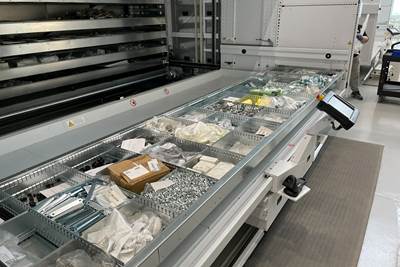Share





Modula uses data-driven manufacturing to make a product that figures into data-driven manufacturing. Its automated storage and retrieval systems are hubs for storing stuff — any hardware, tooling or supplies a facility might need to file away — but they are also hubs for obtaining data about when and how often these items are used. The time and floorspace savings from automated storage and retrieval are perceivable benefits, but the value of the usage data is growing as manufacturing processes become more networked and digital. Indeed, Modula itself relies on an interlinked production system, based on precise knowledge of the timing and flexibility of many steps in the system, in order to cost-effectively produce what is essentially a make-to-order product.
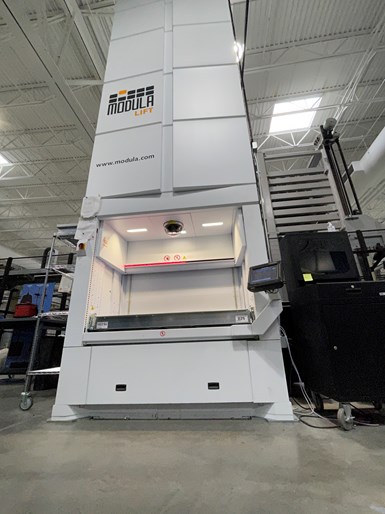
An example of an automated storage and retrieval system made by Modula. This unit is relatively small compared to the size the company is able to build for large facilities. This one is used within Modula's own production process; it stores and tracks tooling for a press brake.
That last point in particular interests me. A theme uniting many manufacturers in many sectors is the drive toward greater responsiveness to the demands of individual users and buyers — that is, shortening lead times and reducing lot sizes in order to provide designs and product options tailored to focused or individual needs. To an extent, Modula epitomizes this goal; its storage systems are tailored to the dimensions and storage demands of individual facilities, and the final steps in production occur within the facility where a given system will be used. Meanwhile, these storage systems are complex. According to Modula USA CEO Antonio Pagano, each one has around 2,000 components and can be configured into hundreds of variations. Modula recently opened a new production facility in Franklin, Ohio, to meet increasing U.S. demand, and I visited it to see what I could learn about make-to-order manufacturing. I learned what the limits are, because the Ohio plant is operating about as near to those limits as it is possible to imagine in the production of this product.
Altix Consulting helped get the plant to this, and that point is a notable detail of this plant’s journey. Modula is headquartered in Italy and producing efficiently there, and manufacturing experts from the home country should have been able to help the Ohio plant get started. However, the plant was launched in 2020 when, suddenly and unexpectedly, no international experts were able to travel. Meanwhile, the new plant’s launch entailed unusual challenges even apart from the pandemic. A pre-existing production facility had to be adapted (formerly the Franklin site was a newspaper printing plant), and production had to be shifted from and coordinated with a smaller, existing Modula plant in Maine. Altix, a manufacturing operations and efficiency consultancy with locations internationally but headquartered in Cincinnati, Ohio, is the nearby source of guidance the Modula team found during a time when the pandemic left it isolated from the corporate headquarters (though Maine personnel were able to come to Ohio to assist with the launch). Altix helped guide the 2020 opening of the plant and then the 2021 shift of production when it came time to balance manufacturing between the Maine and Ohio facilities.
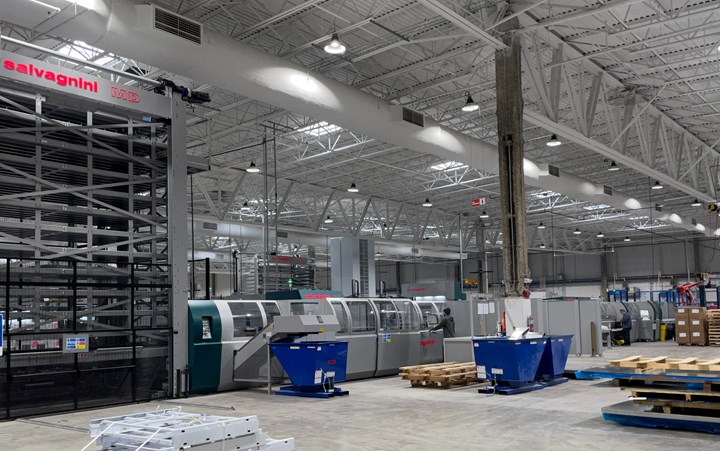
Make-to-order manufacturing favors vertical integration of manufacturing. The Franklin, Ohio, facility performs much of its own part production, on resources including this laser cutting line from Salvignini.
The Ohio plant is now capable of producing 1,000 storage systems per year — three per day. Maine provides another half again of that capacity. The new U.S. production capacity is now fully online, but the world has not yet fully recovered from its crisis. Thus, a facility and a process that aims to be optimal has to function (as it of course always will) within a less-than-ideal world. That reality highlights meaningful points about make-to-order production. How far can this type of production go? Modula’s example illustrates that these are some of the limits to a make-to-order process:
1. Raw material will always be the bottleneck.
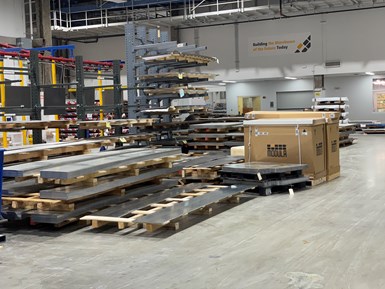
Material production is a step that is inherently impossible to insource. Modula has responded to extreme challenges in obtaining material this year by overordering in some cases, and stocking the excess against future disruptions in material availability.
Responsive, short-lead-time production generally argues for insourcing or vertical integration — establishing capabilities in-house to shorten supply lines and communication. The Modula plant, for example, performs its own part making via sheet-metal cutting and bending. But producing raw material is the capability that cannot be brought in-house, meaning this source of supply can end up governing production’s cost and pace.
“Material is our greatest constraint,” Pagano says. Steel availability has been a serious concern throughout the past two years — to the point that the Ohio plant has taken to over-ordering sheet steel and storing the excess throughout the facility.
2. Supply chain disruptions multiply WIP.
Plenty of other components come from external suppliers as well, and disruption to supply chains has been a hallmark of this past year and the previous one. Modula’s product is complex enough that, in such an environment, it cannot wait for its bill of material to be completely filled for manufacturing to begin. The only way to keep production level while bringing products as near as possible to delivery to the customer is to produce them up to the missing, backordered component. The Ohio plant was designed to include 15 slots for systems in progress and awaiting completion, but all of those parking spaces are filled now, and Modula has contracted to store additional systems off-site. Work-in-process (WIP) is an inevitable result of an anomalous or transitional period in industrial supply chains.
3. Freeze time is a fixed window.
Part of the problem leading to WIP in response to supply chain disruption is the short lead time. Rather than wait to assure it has filled the bill of material, Modula has to begin producing, even with the risk it might be surprised by a supplier delaying shipment of some vital component.
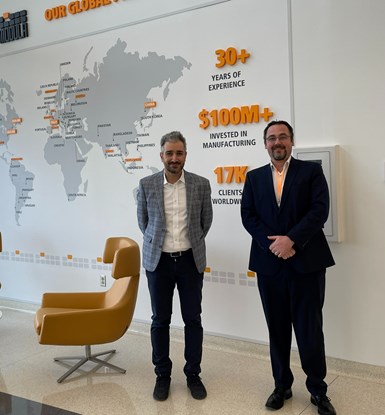
The opening of the Ohio plant coincided with the pandemic. Modula USA was isolated from manufacturing expertise in Italy. It found the expertise it needed in Ohio instead. Seen here are Modula USA CEO Antonio Pagano (left) and Altix Consulting president and CEO Yannick Schilly.
That lead time for Modula is very specific: seven weeks. That is, seven weeks ahead of expected completion and installation at the customer’s site is the “freeze date,” after which no further changes can be made to the design of the system without affecting delivery. At this point, part ordering and production have begun.
In a time that continues to be marked by major disruption, can the company push forward this date, make the window of lead time larger? In effect, it cannot. The reasons do not have to do with a pandemic or supply chain needs, but instead have to do with people. Given any longer than seven weeks, Pagano says, the customer is apt to rethink or alter some detail of the project. That is, given enough time, members of the buying or engineering team within the customer organization are likely to encounter some change or new development that leads them to shift their specifications. This final important set of variables, the most important of all — people, and the aims they are pursuing — also limits how far an efficient manufacturing process can go.
Peter Zelinski writes about manufacturing technology and how it is changing. Find more of his work related to CNC machining and additive manufacturing. To suggest an article topic related to a success in your manufacturing facility or business, or a technology development you are close to, email him here.
Read Next
For Manufacturers, Storage Is an Opportunity for Automation and for Industry 4.0
A maker of automated storage and retrieval systems founded in Europe finds that the leading rationale for adopting these systems is different in the U.S.
Read MoreRegistration Now Open for the Precision Machining Technology Show (PMTS) 2025
The precision machining industry’s premier event returns to Cleveland, OH, April 1-3.
Read MoreBuilding Out a Foundation for Student Machinists
Autodesk and Haas have teamed up to produce an introductory course for students that covers the basics of CAD, CAM and CNC while providing them with a portfolio part.
Read More




















.jpg;maxWidth=300;quality=90)



